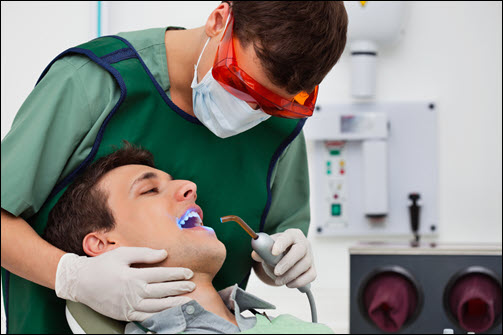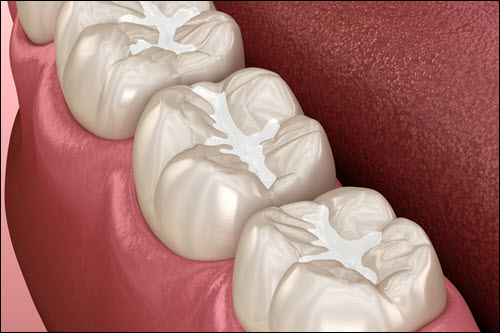Dental sealants are a proactive and effective measure for protecting teeth from cavities and decay. They are a common preventive treatment used by dental professionals to safeguard both children and adults against tooth decay. This is especially true for in hard-to-reach areas. Here’s a closer look at what sealants are and the benefits they offer.
What Are Dental Sealants?
Dental sealants are thin, protective coatings applied to the chewing surfaces of the back teeth, known as molars and premolars. These teeth are more prone to cavities due to their deep grooves and fissures. The grooves and fissures can trap food particles and bacteria. Sealants create a barrier that prevents food and bacteria from entering these grooves, thereby reducing the risk of tooth decay.
 How Dental Sealants Work
How Dental Sealants Work
-
- Application Process: The application of sealants is a quick and painless procedure. The dentist will first clean and dry the teeth, then apply a special gel to etch the surface, which helps the sealant adhere. After rinsing and drying, the sealant is applied to the chewing surfaces and hardened with a special light.
- Longevity: They can last several years, though they may need to be reapplied over time. Regular dental check-ups will allow your dentist to monitor the condition of the sealants and reapply them if necessary.
Benefits of Dental Sealants
-
- Cavity Prevention: Sealants provide a protective shield against tooth decay, significantly reducing the risk of cavities in the back teeth. Studies have shown that they can reduce the risk of decay by up to 80% in molars.
- Cost-Effective: Preventive treatments like sealants are generally more cost-effective than restorative treatments for cavities. By preventing decay, sealants can save you money in the long run by reducing the need for fillings and other dental work.
- Quick and Painless: The application of sealants is a non-invasive and painless procedure that can be completed in a single visit to the dentist. It requires no drilling or removal of tooth structure.
- Enhanced Oral Health: By protecting the teeth from decay, sealants contribute to overall better oral health. They help maintain the integrity of the teeth, reduce the likelihood of painful cavities, and support long-term dental wellness.
- Ideal for Children and Adults: While sealants are particularly beneficial for children, who are more susceptible to cavities, adults can also benefit from them, especially if they have deep grooves in their teeth or a history of cavities.
Dental sealants are a valuable preventive measure in maintaining good oral health and protecting your teeth from decay. By applying sealants, you can safeguard the vulnerable surfaces of your molars and premolars, reduce your risk of cavities, and avoid more invasive and costly dental treatments in the future. Consult with your dentist to determine if dental sealants are the right choice for you or your family, and take a proactive step toward maintaining a healthy smile.




